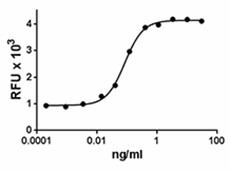- Regulatory Status
- RUO
- Other Names
- Granulocyte colony stimulating factor, CSF3, CSFG, MGI-IG

-

Mouse G-CSF induces the proliferation of mouse M-NFS-60 lymphoblast cells.
| Cat # | Size | Price | Quantity Check Availability | ||
|---|---|---|---|---|---|
| 574604 | 25 µg | $347.00 | |||
| 574606 | 100 µg | $897.00 | |||
| 574608 | 500 µg | $2338.00 | |||
G-CSF is the key hematopoietic cytokine involved in the control of neutrophil production; therefore it is a critical regulator of innate immunity against bacterial infections. G-CSF mobilizes stem cells indirectly by down-regulating the expression of CXCL12 on marrow osteoblasts and by releasing neutrophil and monocyte proteolytic enzymes, including neutrophil elastase, cathepsin G, and matrix metalloproteinase-9, which in turn degrade important HSC-trafficking and adhesion molecules c-kit, VCAM-1, and CXCR4. In addition, G-CSF possesses immunosuppressive effects on monocytes/ macrophages, dendritic cells, and T lymphocytes. The receptor for G-CSF is expressed not only in hematopoietic cells; in addition, it is expressed in cardiomyocytes, skeletal muscle, and neurons. G-CSF influences mouse skeletal muscle development and regeneration by stimulating myoblast proliferation. In vitro, G-CSF displays strong antiapoptotic activity in neuronal cells.
Product Details
- Source
- Mouse G-CSF, amino acids Val31-Ala208 (Accession# NM_009971) was expressed in E. coli.
- Molecular Mass
- The 179 amino acid recombinant protein has a predicted molecular mass of approximately 19 kD. The DTT-reduced and non-reduced protein migrate at approximately at 20 kD by SDS-PAGE. The N-terminal amino acid is Met.
- Purity
- >98%, as determined by Coomassie stained SDS-PAGE.
- Formulation
- 0.22 µm filtered protein solution is in PBS.
- Endotoxin Level
- Less than 0.01 ng per µg cytokine as determined by the LAL method.
- Concentration
- 10 and 25 µg sizes are bottled at 200 µg/mL. 100 µg size and larger sizes are lot-specific and bottled at the concentration indicated on the vial. To obtain lot-specific concentration and expiration, please enter the lot number in our Certificate of Analysis online tool.
- Storage & Handling
- Unopened vial can be stored between 2°C and 8°C for up to 2 weeks, at -20°C for up to six months, or at -70°C or colder until the expiration date. For maximum results, quick spin vial prior to opening. The protein can be aliquoted and stored at -20°C or colder. Stock solutions can also be prepared at 50 - 100 µg/mL in appropriate sterile buffer, carrier protein such as 0.2 - 1% BSA or HSA can be added when preparing the stock solution. Aliquots can be stored between 2°C and 8°C for up to one week and stored at -20°C or colder for up to 3 months. Avoid repeated freeze/thaw cycles.
- Activity
- ED50 =0.02 - 0.08 ng/ml, corresponding to a specific activity of 1.25 - 5.0 x 107 units/mg, as determined by M-NFS-60 cell proliferation induced by mouse G-CSF in a dose dependent manner.
- Application
-
Bioassay
- Application Notes
-
BioLegend carrier-free recombinant proteins provided in liquid format are shipped on blue-ice. Our comparison testing data indicates that when handled and stored as recommended, the liquid format has equal or better stability and shelf-life compared to commercially available lyophilized proteins after reconstitution. Our liquid proteins are verified in-house to maintain activity after shipping on blue ice and are backed by our 100% satisfaction guarantee. If you have any concerns, contact us at tech@biolegend.com.
- Additional Product Notes
-
View more applications data for this product in our Scientific Poster Library.
- Product Citations
-
Antigen Details
- Structure
- Heterodimer
- Distribution
-
Monocytes, mesothelial cells, fibroblasts, endothelial cells, and neurons.
- Function
- G-CSF acts on myeloid progenitor cells to stimulate survival, proliferation, and neutrophilic maturation; on mature neutrophils, G-CSF enhances survival, superoxido anion and alkaline phosphatase production, arachidonic acid release, and antibody dependent cellular cytotoxicity.
- Interaction
- Hematopoietic progenitor cells, neutrophilic granulocytes, monocytes, platelets, endothelial cells, trophoblastic cells, myoblasts, cardiomyocytes, neurons, and some small cell lung carcinoma cell lines.
- Ligand/Receptor
- G-CSFR.
- Cell Type
- Embryonic Stem Cells, Hematopoietic stem and progenitors
- Biology Area
- Cell Biology, Stem Cells
- Molecular Family
- Cytokines/Chemokines, Growth Factors
- Antigen References
-
1. Kim HK, et al. 2006. Blood 108:812.
2. Donahue RE, et al. 2009. Blood 114:2530.
3. Shimoji K, et al. 2010. Cell. Stem. Cell. 6:227.
4. Martins A, et al. 2010. IUBMB Life 62:611.
5. Hara M, et al. 2011. J. Exp. Med. 208:715. - Gene ID
- 12985 View all products for this Gene ID
- UniProt
- View information about G-CSF on UniProt.org
